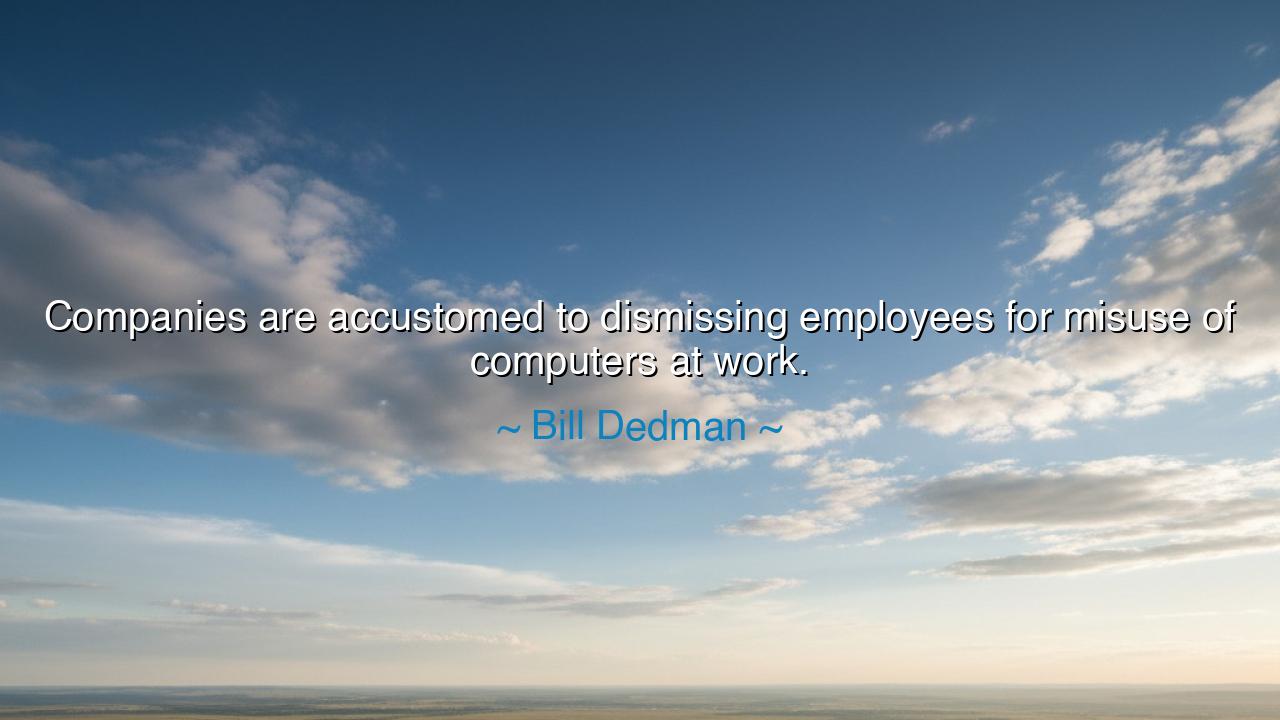
Companies are accustomed to dismissing employees for misuse of






In the age of machines and glowing screens, when labor is no longer measured by the sweat of the brow but by the tapping of keys, the journalist Bill Dedman observed a quiet truth of the modern world: “Companies are accustomed to dismissing employees for misuse of computers at work.” These words, though simple, strike like a bell that echoes through the corridors of the digital age. They remind us that power, once held in tools of iron and steam, now rests in circuits and code — and with that power comes both creation and corruption. Dedman’s quote, therefore, is not only about discipline or employment, but about the fragile ethics of technology, and the way it shapes the character of humankind.
The meaning of this quote extends beyond the workplace. At its surface, Dedman speaks of companies that sever ties with those who misuse the tools of their trade — who waste hours in distraction, breach security, or use their computers for deeds that betray trust. But beneath that surface lies a deeper reflection on responsibility. The computer, that quiet instrument of endless possibility, is neither good nor evil — it is a mirror. It reflects the intentions of its user. When misused, it becomes an agent of chaos; when wielded wisely, it becomes a channel for progress and light. In speaking of misuse, Dedman speaks not merely of breaking company rules, but of betraying one’s own integrity — the sacred trust between creator and creation.
The origin of these words lies in the shifting balance between man and machine. When Dedman first wrote of such matters, the world was awakening to the realization that the computer had transformed not only commerce but consciousness. No longer were workers bound to paper, pen, and ledger; the computer had made every individual a potential node of immense power — capable of building or breaking systems with a single keystroke. And as companies discovered the power of networks, they also discovered their vulnerability. A careless email, a stolen password, an act of idleness disguised by a glowing screen — all these became threats not only to productivity but to the very fabric of trust upon which labor depends.
History, too, offers warnings in this regard. Consider the story of Alan Turing, the great mathematician who harnessed the early power of computation to crack the codes that once shielded tyranny. He used machines not for self-interest, but for service to humanity. Yet even he — the father of modern computing — fell victim to a society that misunderstood the very principles he stood for: honesty, responsibility, and truth. Turing’s tragedy reminds us that technology is a reflection of the world that wields it. When governed by justice, it liberates; when ruled by ignorance or carelessness, it punishes. Dedman’s observation belongs to that lineage — a reminder that the misuse of machines, whether by deceit or neglect, carries the weight of moral consequence.
But there is another layer to Dedman’s words — one that calls us to compassion as well as caution. To be “accustomed to dismissing employees” reveals not only the vigilance of employers, but the alienation of modern work. In the rush to efficiency, corporations may forget the human spirit behind the machine. In punishing misuse, they often neglect to ask what drove it — boredom, fatigue, lack of meaning, or despair. The cubicle and the computer have replaced the forge and the field, but the hunger of the human heart remains the same: to find purpose, to create, to belong. Thus, the challenge of our era is not only to prevent misuse but to restore meaning — to make technology serve humanity, not enslave it.
The lesson, then, is twofold. For the worker, it is a call to mindfulness — to use the tools of one’s trade with integrity and respect, to remember that every keystroke leaves a mark not only on a screen but on the soul. For the employer, it is a reminder of stewardship — that discipline without understanding breeds fear, and fear is the enemy of creativity. True leadership seeks not merely to punish misuse, but to cultivate wisdom — to teach that power, when guided by virtue, becomes innovation, and when left unchecked, breeds corruption.
So, O listener, let these words of Bill Dedman echo in your conscience: the computer is not merely a machine; it is a reflection of who you are. Treat it with care, as you would any instrument of power. Let your work be guided by honor, not expedience. Seek purpose in every task, and integrity in every action. For in this age of screens and servers, the truest test of character is not in how fast we type, but in how wisely we use the tools that shape our world. And remember always — it is not the misuse of computers that defines our age, but the courage to use them rightly, with both intelligence and heart.






AAdministratorAdministrator
Welcome, honored guests. Please leave a comment, we will respond soon